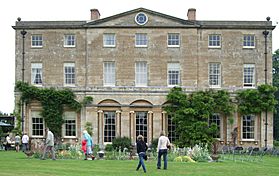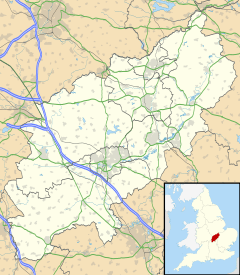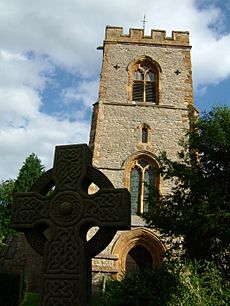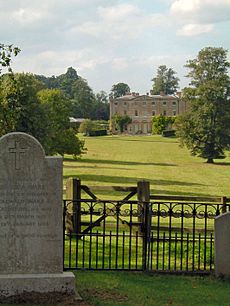Courteenhall facts for kids
Quick facts for kids Courteenhall |
|
|---|---|
 Courteenhall House pictured during the biennial Fête, Saturday 7 June 2008 |
|
| Population | 95 (2010 est) 122 (2011 census) |
| OS grid reference | SP760530 |
| • London | 65 miles (105 km) |
| Civil parish |
|
| Unitary authority |
|
| Ceremonial county | |
| Region | |
| Country | England |
| Sovereign state | United Kingdom |
| Post town | NORTHAMPTON |
| Postcode district | NN7 |
| Dialling code | 01604 |
| Police | Northamptonshire |
| Fire | Northamptonshire |
| Ambulance | East Midlands |
| EU Parliament | East Midlands |
| UK Parliament |
|
Courteenhall is a small village in Northamptonshire, England. It's about 5 miles (8 km) south of Northampton and 66 miles (106 km) north of London. In 2011, about 122 people lived here. The village is found at the end of a road that doesn't go anywhere else, like a quiet cul-de-sac.
Contents
How Courteenhall is Governed
Courteenhall is part of West Northamptonshire. It belongs to the Towcester and Roade areas, which are called 'wards'. Since 2010, the village has been part of the South Northamptonshire area for choosing Members of Parliament.
Where is Courteenhall Located?
The M1 motorway runs close to the northeast side of the village. Junction 15 of the M1 is only about 1 mile (1.6 km) away. The main part of Courteenhall is on a road that doesn't go all the way through. The village has its own Parish Meeting, which is like a local council. It usually meets twice a year. Courteenhall shares a church leader, called a rector, with the nearby villages of Roade, Ashton, Collingtree, and Hartwell.
Village Facilities
Courteenhall is a very small village. In 2003, fewer than 100 people lived there. It only has a church and no other services. For shops, schools, and other things, people rely on the nearby village of Roade. The post office in Courteenhall opened in 1883 but closed in February 1996.
Courteenhall's History
The name of the village might mean "Corta's/Curta's nook of land" or "nook of the enclosed piece of land."
The Church of St Peter and St Paul
The village church is very old, dating back to the 12th century. Today, it is part of "The Five Parishes" group of churches. This group includes churches from Roade, Collingtree, Ashton, and Hartwell. The old Rectory, where the church leader used to live, is next to the church. The church also has some interesting old tombs. In 1851, about 100 people from the village's 127 residents attended church on a special census day. The Rectory building was built in 1805.
Courteenhall House (The Hall)
The village grew up around the large Courteenhall House estate. The beautiful park around the house covers about 370 acres (150 hectares). There are also formal gardens near the house.
A man named Samuel Jones bought the estate in 1647. He was knighted in 1660. After he died in 1673, his great-nephew, Samuel Wake, inherited the estate. The Wake family is said to be related to Hereward the Wake. He was a Saxon hero who fought against the Norman Conquest of England.
The park was designed in 1791 by Humphry Repton for Sir William Wake. The Hall itself was also built in 1791. It was designed by an architect named Samuel Saxon. Courteenhall House is a private home, but you can see it from the village church. Sheep graze in the main park, but a special ditch called a ha-ha keeps them out of the Hall's garden. The Wake family still lives in Courteenhall House today. Sir Hereward Charles Wake is the current head of the family.
The Stables and School House
The stables were built around 1750 in the Palladian style. This style is different from the main house. Also on the grounds is the old Free Grammar School House, built around 1680. It still has its original school furniture, including a raised seat for the school master. This school was set up according to the will of Sir Samuel Jones.
Visiting Courteenhall
Courteenhall House is rarely open to the public. However, you can sometimes hire it for private events. The village is at the end of a narrow road, and there isn't much parking. Visitors are advised to park outside the village. You can then use one of the many public footpaths to walk into the village. If you visit during the special fête, you can park using the main drive from the A508 road.
Biennial Fête
A big village fair, called a fête, is held every two years in June. This is a great chance to see the outside of Courteenhall House. You can also explore the grounds, which include a large collection of trees called an arboretum. This event helps to raise thousands of pounds to keep the church in good condition. Parts of the church are more than 800 years old.
Notable People from Courteenhall
- Sir Richard Lane (1584–1650) – He was a very important lawyer and judge for King Charles I.
- Joan Wake (1884–1974) – She was a well-known historian.
 | Ernest Everett Just |
 | Mary Jackson |
 | Emmett Chappelle |
 | Marie Maynard Daly |




